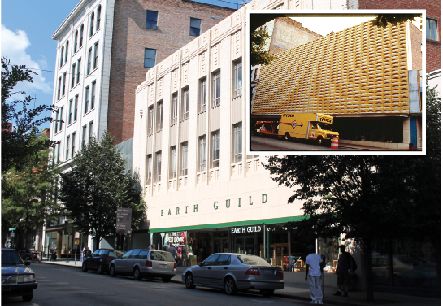Haywood Street was virtually empty two decades ago. In 1990, we (the members of Earth Guild) bought the old Bon Marché building. We renovated the Haywood Street level for Earth Guild, which we moved from its original location on Tingle Alley. We made our home on the top floor. In the mid-’90s, the second floor and basement level were renovated into office suites and, in 2002, the basement was redeveloped for the N.C. Stage Company. The building became a model for mixed use in downtown and spurred the redevelopment of many other buildings in its block and on adjacent blocks.
I was first elected to Asheville City Council in November 1991 and served for the next 10 years. Mayor Ken Michalove, in his wisdom, appointed me to chair the Asheville Urban Area Transportation Advisory Committee, and my first task was to set up a stakeholders participation process, funded by a $50,000 federal grant, to select the route for the Interstate 26 Connector. You can see where that got us — 23 years later and still no solution. He also appointed me to the Buncombe County Environmental Affairs Committee that sited Buncombe County’s current award-winning landfill and initiated recycling for the city and county.
Once elected to Council, I was immediately thrown into the controversy around the widening of Broadway from UNC Asheville into downtown and the fight for and against putting ballfields in North Asheville.
Charlie Worley chaired the Unified Development Ordinance Committee — a much-needed update of our antiquated 1950s-era planning ordinances and an attempt to put all development rules into one document. There was a drawn-out fight over the sign ordinance and the amortization of billboards in the city. After a marathon City Council meeting that lasted almost until midnight, we finally passed the UDO.
We lived through the firing of the best city manager in North Carolina, Doug Bean, and the attempt to recall the four City Council members who voted to dismiss him. (Gene Ellison taught me to count to four.)
I will never forget the City Council meeting at the Civic Center where several hundred people came to comment on the proposed nondiscrimination ordinance — which we adopted later that night. This document put in writing Council’s commitment to “prohibit discrimination against any person for any reason that is not related to bona fide occupational qualifications” in its hiring practices. There were threats against the Council and, while we sat on the stage listening to input from many speakers, police officers were lined up in front of us on the floor of the Thomas Wolfe Auditorium to prevent anyone from approaching us.
The present-day downtown emerged from many building projects in the ’90s. Pack Place opened and spurred development along Biltmore Avenue. The Haywood Park Hotel complex on Haywood Street was renovated in 1984.
In 1993, the new 28,000-square-foot Public Works complex on South Charlotte street demonstrated the city’s commitment to its urban core. That was followed by the renovation of the Municipal Building, the creation of a new Bus Transfer Center on Coxe Avenue, the redesign of Pritchard Park and the renovation of Stephens Lee into a new community center.
And there was the Blizzard of ’93.
Everyone found out that I went to Woodstock in the fall of 1994 by reading Barbara Blake’s full-page article in the Asheville Citizen-Times. I think more people remember that about me than anything I did during my 10 years on City Council.
During the mid-’90s, there were ongoing efforts to look at the future of the Civic Center and to position it in the regional market. There were dozens of citizen-participation meetings, which ended up with several unimplemented plans for both renovation and new construction.
Prince Charles visited the Biltmore Estate in 1996.
The city’s greenway was established along Weaver Boulevard and Broadway and, in 1998, a comprehensive Greenway Master Plan was passed. The Pedestrian Thoroughfare Plan, which assures an accessible and walkable community, was passed in 1999.
Asheville became an All American City in 1997.
A cell-tower ordinance was spearheaded by Chuck Cloninger in 1996, and Asheville ended up with one of the strongest in the Southeast. Of course, that didn’t happen without a fight.
Going from partisan City Council elections with two-year terms to nonpartisan, staggered four-year terms happened in 1997.
And every week, each of us on Council looked forward to opening the Mountain Xpress and finding out which one of us was the center of a Molton cartoon.
Barbara Field worked as an architect at SPACEPLAN Architects from 1980 to 2005. She opened her own practice in 2006. Besides serving on Asheville City Council for 10 years, she also served as vice mayor. Along with six others, she owns Earth Guild, a national craft-supply center selling the tools, materials and books for traditional and contemporary crafts.





Before you comment
The comments section is here to provide a platform for civil dialogue on the issues we face together as a local community. Xpress is committed to offering this platform for all voices, but when the tone of the discussion gets nasty or strays off topic, we believe many people choose not to participate. Xpress editors are determined to moderate comments to ensure a constructive interchange is maintained. All comments judged not to be in keeping with the spirit of civil discourse will be removed and repeat violators will be banned. See here for our terms of service. Thank you for being part of this effort to promote respectful discussion.